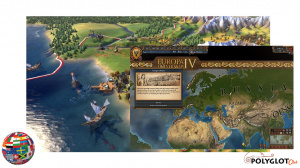Difference between revisions of "Language/Multiple-languages/Culture/Video-Games-with-Real‐Life-Civilisations"
| Line 17: | Line 17: | ||
What's more, there is a Civilopedia, with introductions about those civilizations. You can spend several hours on it if you like. | What's more, there is a Civilopedia, with introductions about those civilizations. You can spend several hours on it if you like. | ||
Note that the reviews of Civ VI are much more negative than Civ V. | |||
http://store.steampowered.com/app/8930/Sid_Meiers_Civilization_V/ | http://store.steampowered.com/app/8930/Sid_Meiers_Civilization_V/ | ||
Revision as of 20:09, 30 August 2018
Some video games feature various cultures of the world, and they are proved to be successful. Here are two series of them, which are the most famous ones.
Sid Meier's Civilizations
This series is an important example of 4X (eXplore, eXpand, eXploit, and eXterminate) games. You can choose a civilization, and develop it to compete with others. Each civilization has its own leader and some different, unique advantages in different aspects. There are Barbarians, who will attack you, and the City States, which you can befriend with or conquer.
It is turn-based. In each turn, you can order your units to do something, and if your Cities are not busy, you can order them to construct a building or train a unit. You can also develop Technologies, and then unlock new features, step by step.
There are Natural Wonders which will give you the bonus if you build a city near it. You can build World Wonders, but they can be built only once, other players can't build it if it is finished by another. If in progress, it will be cancelled automatically.
You need to pay attention to your Coins, Resources, and your people's Happiness. If there are exceeding Happiness accumulated, then a Golden Age will come, many things will have a bonus. Also, you should notice there are points of Culture and Religion. With Cultural Points, you can unlock Policies, and when it comes to Industrial Era, you can choose an Ideology. With Religious points, you can found a Pantheon first, and later found a Religion or enhance it through a Prophet, spread it by Missionaries and protect it by Inquisitors.
If you have accumulated enough Great Person Points, then some Great People will be born, including Artists, Musicians, Writers, Engineers, Scientists. You can make use of them to benefit. Great Generals and Great Admirals will be born through warfare, who are helpful strategically in a war.
There are more than one way to victory, so you don't need to fight a war to win if you like.
What's more, there is a Civilopedia, with introductions about those civilizations. You can spend several hours on it if you like.
Note that the reviews of Civ VI are much more negative than Civ V.
http://store.steampowered.com/app/8930/Sid_Meiers_Civilization_V/
http://store.steampowered.com/app/289070/Sid_Meiers_Civilization_VI/
http://civilization.wikia.com/wiki/Civilization_Games_Wiki
Europa Universalis
This series is really a worldwide Grand Strategy series. In the games, it is not real-time, you can pause when you like if you play the single player.
You can choose a nation and start the game. Each nation has its own special modifier on six aspects.
It is very complicated to play the game. You need to spend hours, lose the game several times to get used to it. If you are a beginner, you'd better pick a European faction, otherwise, you will probably be subdued by European colonization.
Expansion packs are indispensable if you want to fully enjoy.
http://store.steampowered.com/app/236850/Europa_Universalis_IV/
http://europauniversalis.wikia.com/wiki/Europa_Universalis_Wiki
Similar series of Paradox Interactive are Crusader Kings, focusing on individuals in medieval, and its prototype Sengoku; Hearts of Iron, an unrealistic World War II game, though being unrealistic is not its purpose; Stellaris, a sci-fi game.
